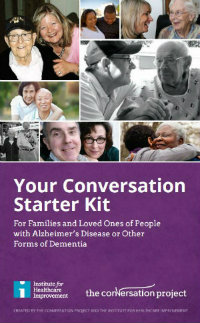 Editor’s Note: Today, we welcome Pulitzer Prize-winning writer Ellen Goodman, co-founder and director of The Conversation Project, to Health AGEnda. The Conversation Project is part of a $3.5 million John A. Hartford Foundation grant approved in March supporting an exciting collaborative of six practitioners who will work cooperatively to expand the availability and improve the quality of advance care planning and end-of-life care. Since it was launched in 2010, The Conversation Project has focused on helping families and friends talk openly about their wishes for end-of-life care in a way that makes sure those wishes are not only expressed, but respected.
Editor’s Note: Today, we welcome Pulitzer Prize-winning writer Ellen Goodman, co-founder and director of The Conversation Project, to Health AGEnda. The Conversation Project is part of a $3.5 million John A. Hartford Foundation grant approved in March supporting an exciting collaborative of six practitioners who will work cooperatively to expand the availability and improve the quality of advance care planning and end-of-life care. Since it was launched in 2010, The Conversation Project has focused on helping families and friends talk openly about their wishes for end-of-life care in a way that makes sure those wishes are not only expressed, but respected.
When we launched The Conversation Project, we knew the importance of encouraging people to express their wishes for end-of-life care before there was a crisis. In a survey we did, people often gave the same excuse for not having the conversation: “it’s too soon.” To which we always replied, “It’s always too soon, until it’s too late.”
There is nothing that shows the wisdom of that statement more than the terrible experiences of families and friends whose loved ones suffer from Alzheimer’s and other dementias. We—and my family is part of that “we”—often feel tragically unable to have these important conversations after someone we love goes into cognitive decline.
 Click image to view or download a PDF.
Click image to view or download a PDF.Dementia may be the highest motivation to have conversations about end-of-life care while we still can. But at the same time, we can also help friends and families during the decline. It isn’t too late.
After we created our first Conversation Starter Kit, we began to hear again and again from people who said, “But what if my mom, dad, sister, husband isn’t able to fully talk about their wishes? What if they have Alzheimer’s disease? Dementia?”
This was such a constant refrain, so obviously a need, that we set out to create a Conversation Starter Kit directly geared to those suffering from their own decline or that of a loved one. We wanted a guide that would hold their hand through the process, make it easier to understand and share wishes. And thus, the Alzheimer’s disease and other forms of Dementia Starter Kit was born.
We deeply hope that this will help all of you, your families, your patients, clients, friends. And so, we add this to our roster of tools to make it easier for people to share what matters to them about the way they want to live, even toward the end.
This is the 17th in an occasional series. See other Health AGEnda posts on Tools You Can Use:
New Collaborative Guideline Spotlights Optimal Care for Older Adults Undergoing Surgery
State-by-State Palliative Care Report Card
What You Need to Know About Evidence-Based Programs
An Online Educational Series Focusing on Dementia in Older Adults
The Quality Care Through a Quality Workforce Toolkit
Webinar Series Covers Geriatrics-Competent Care for Medicare-Medicaid Population
The Essentials of Cardiovascular Care in Older Adults
Residency Training Toolkits and Best Practices Guidelines for Surgeons and Related Specialists
Geriatric Transitions Objective Structured Video Examination
A Non-pharmacologic Toolkit for Addressing Behavioral and Psychological Symptoms of Dementia
A New APProach to Treating Older Patients
Detecting Cognitive Impairment During the Medicare Annual Wellness Visit
Preparing a Personal Advance Care Plan
Guidelines for Assessing Patients Facing Surgery
Principles for Treating Patients with Multiple Chronic Conditions
